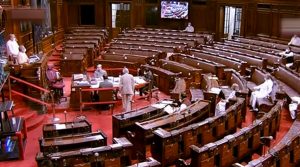Parliamentary Privileges:

Vice-President and Rajya Sabha Chairman M Venkaiah Naidu has said that disrupting parliamentary proceedings amounts to contempt of the House and it cannot be claimed as a privilege.
- This is the first time that a presiding officer of any legislature in the country has taken a public position on the issue of disruptions in the Parliament.
- The productivity of Rajya Sabha has been quantified since 1978. During the first 19 years till 1996, the productivity of the House has been over 100 per cent, but it has begun to decline since then.
- While the House clocked an annual productivity of over 100 per cent during 16 out of these 19 years, it was so only in two years — in 1998 and 2009 — that it clocked 100 percent productivity in the preceding 24 years. Rajya Sabha has not clocked 100 percent productivity even once in the past 12 years.
Parliamentary Privileges:
- Parliamentary Privileges are certain rights and immunities enjoyed by members of Parliament, individually and collectively, so that they can “effectively discharge their functions”.
- Article 105 of the Constitution expressly mentions two privileges, that is, freedom of speech in Parliament and right of publication of its proceedings.
- Apart from the privileges as specified in the Constitution, the Code of Civil Procedure, 1908, provides for freedom from arrest and detention of members under civil process during the continuance of the meeting of the House or of a committee thereof and forty days before its commencement and forty days after its conclusion.
Motion against breaches:
- When any of these rights and immunities are disregarded, the offence is called a breach of privilege and is punishable under law of Parliament.
- A notice is moved in the form of a motion by any member of either House against those being held guilty of breach of privilege.




